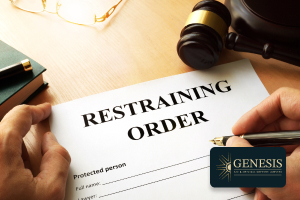
Domestic violence is a significant concern that affects many individuals and families. It involves harmful behaviors within domestic relationships, such as between spouses, partners, or family members. Domestic violence isn't just physical. It includes emotional, psychological, and sexual abuse. Recognizing the signs and understanding the legal implications are crucial for victims and those accused.
At Genesis DUI & Criminal Defense Lawyers, we know that intimate partner violence can include physical violence, sexual violence, economic abuse, psychological abuse, and any other type of abusive behavior.
Understanding what constitutes an abusive relationship is critical to addressing any accusations. These actions often have lasting effects on everyone involved. Knowing the legal definitions and consequences is essential for anyone involved in such situations. If you have been accused of engaging in domestic abuse or other abusive relationships, learn more below. Then, contact us to schedule a case consultation.

In criminal law, domestic violence refers to a range of behaviors that occur in domestic settings. These behaviors include physical assault, threats, intimidation, and emotional abuse. The law aims to protect victims and hold perpetrators accountable. It recognizes the unique nature of domestic violence, given the close relationships between the involved parties.
Arizona law explicitly defines domestic violence under Arizona Revised Statutes §13-3601. This definition includes a variety of acts committed against a current or former spouse, a person residing in the same household, or a person with whom the offender has a child. The law also covers abuse against pregnant women and elderly family members. Understanding this definition helps in recognizing and addressing domestic violence.
Domestic violence in Arizona encompasses various acts that harm or threaten harm to family or household members. This broad definition ensures comprehensive protection for victims. Recognizing these acts is the first step in seeking help or legal recourse.

Physical assault and battery are common forms of domestic violence. They involve causing bodily harm or threatening to harm someone in the household. This includes hitting, slapping, and other forms of physical contact. The law takes these acts seriously, given the breach of trust involved.
Victims of physical assault in domestic settings often face emotional and psychological trauma in addition to physical injuries. For these reasons, if you have been accused of domestic violence, you need to reach out to a lawyer as soon as possible. Arizona law treats these offenses with severity, primarily when they result in serious physical injury or involve weapons.
Harassment and emotional abuse are forms of domestic violence that can be as damaging as physical abuse. They include behaviors like constant criticism, belittling, and threats. These acts can erode a person's sense of self-worth and autonomy.
Emotional abuse often goes unrecognized because it doesn't leave visible scars. However, it's essential to acknowledge its impact. The law recognizes these forms of abuse as part of domestic violence. They are prosecuted just as vigorously. If accused of emotional abuse, give us a call to schedule a case consultation.
Threats and intimidation play a significant role in domestic violence cases. These behaviors create an atmosphere of fear and control. They can include verbal threats, stalking, or displaying weapons. These actions are often used to manipulate and coerce victims.
These forms of abuse can be subtle yet pervasive. Understanding the seriousness of threats and intimidation is essential in addressing domestic violence charges. Call us to schedule a consultation if you are accused of making criminal threats.

If accused of domestic violence, it's essential to understand your rights. Everyone has the right to a fair legal process. This includes the right to an attorney and the presumption of innocence until proven guilty. Understanding these rights is crucial for an adequate defense.
The accused also have the right to examine the evidence against them and to present their evidence. They can challenge the accusations in court. It's essential to navigate these rights carefully, ideally with the help of a skilled attorney.
Restraining orders and legal injunctions are standard in domestic violence cases. They are designed to protect victims by legally preventing the accused from contacting them. Understanding how to respond to these orders is crucial for both parties involved.

If a restraining order is issued against you, it's essential to understand its terms. Violating a restraining order can result in serious legal consequences. Adhere strictly to the conditions set out in the order.
In responding to a restraining order, seek legal advice. An attorney can help you understand the implications and guide you in the right approach. Addressing these orders with seriousness and respect for the legal process is crucial.
Violating a restraining order is a criminal offense. It can lead to arrest and further legal complications. This violation can be used as evidence in domestic violence cases, potentially worsening your situation.
If accused of violating a restraining order, seeking legal assistance is vital. An attorney can help you navigate the charges and present your story. Remember, compliance with lawful orders is essential.
Challenging a restraining order involves proving that it was unwarranted or based on false information. Present evidence that contradicts the reasons for the order. This can include communication records or witness statements.
An attorney can assist in challenging a restraining order. They can help gather evidence and present a strong case. This process requires a thorough understanding of legal procedures and rights.
Domestic violence charges can significantly impact child custody and divorce proceedings. Courts consider these charges seriously when determining custody arrangements. The safety and well-being of the children are paramount.
Accusations of domestic violence can lead to limited or supervised visitation rights. In divorce cases, these charges can affect the division of assets and spousal support. It's essential to address these charges diligently in court.
Defending against domestic violence allegations often involves presenting mitigating factors. These factors can provide context to the incident and may influence the court's understanding of the situation. An experienced attorney can effectively highlight these aspects, potentially leading to a more favorable outcome.
In presenting these mitigating factors, an attorney can help create a more nuanced and complete picture of the incident. This approach doesn't excuse domestic violence but aims to ensure a fair and appropriate consideration of all relevant aspects. A skilled attorney can guide the accused through this complex process, seeking a resolution that acknowledges these mitigating circumstances.

The prospect of domestic violence charges can be overwhelming and stressful. Genesis DUI and Criminal Defense Lawyers are here to support you through this challenging time. Our team understands the complexities of domestic violence cases. We are committed to offering compassionate and comprehensive legal services.
Contact us for a consultation, and let us help you navigate this difficult situation.





"*" indicates required fields